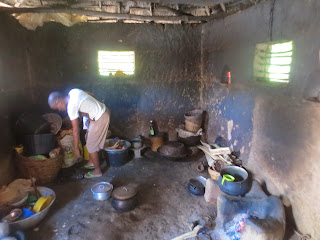People say that the Church is the same in Salt Lake City as it is in Paris, or Rome, or Spanish Fork. It is, and it isn’t. We have been working with the members of the Madina 1st and 2nd Ward of the Adenta Stake helping with the temple preparation classes to get folks to the temple for their own endowments. As a result we attended two sacrament meetings, two Sunday school classes, and one priesthood / relief society meeting each week for the last six weeks. We meet in the stake center which is a fairly new building. It has air conditioning in the bishops’ and presumably the stake president’s offices. In the chapel and the cultural hall it has about two dozen ceiling fans which do a reasonably good job of making the building habitable on Sunday morning when the windows are opened. The classrooms are also “air conditioned” with open windows, ceiling fans, and another window above the blackboard and the door which opens into the hallway even when the door is closed. I didn’t see any similar construction in my ward in Salt Lake.
In Rome I did see people leave the windows open, briefly. Then a breeze came up and we had to close them

The announcements are different too. Today the bishop announced an event to occur in seven days and described it as “today Saturday” which clearly distinguishes it from two or three Saturdays from now. I love this same bishop’s announcements on starting times for events. “The young single adult activity will be Saturday at 10:00, that’s 10:00, 10:00. It is not 10:10 but 10:00.” As a former bishop who started many an early morning sacrament meeting at 9:00 with one fourth of the ultimate congregation present I can relate completely to his frustration and I love his method of dealing with it.
The bishop and all the speakers begin with “good morning brothers and sisters.” To which the congregation responds “good morning.” Kind of like going to church in Hawaii without the lei. Our speakers have the good taste not to say “I can’t hear you, lets try that again.”
The brethren all have one hand behind their back as they pass the sacrament. On the sacrament table is the two liter bottle of pure water they poured the sacrament water from.
The halls of the Ghanan building a just like those in Salt Lake, Spanish Fork and in Rome. They are crowded with Saints who are so busy talking with their friends they haven’t seen since last Sunday that Sunday School and Relief Society / Priesthood meeting start late because the teachers can’t get through the crowd and there is no one in the class room to teach anyway. They are all in the hall.

Ghana and Utah have both suffered the impact of being away from the center of the King’s English. We all know that that stream which runs out of the mountains in Utah is a crick, that we go to the Spanish Fork art museum to see a pitcher and that we are really going fishing on the Sourh Fark of the Provo River. For instance in Ghana this morning we sang Faader in Heaven We Do Believe” but we sang it on key and with vigor. Ghanans Sunday School has one leg up on Utah though. Ghana has Twii (pronounced tree) and Ashanti which are tribal languages. At least half the testimonies in sacrament meeting are in Twii as are some of the answers to teachers’ questions in Sunday School. Today in one of our classes the wife of one of the bishopric member’s stood up half way through the class and used the chart of the plan of salvation on the black board with her explanation to the Twii speaking sisters of what they needed to know before they go to the temple. Twii is one of the options on the head phones in the Accra temple. The bishop in the other ward listened to the answer to one of his questions from a class member and then said “for those of you who don’t speak Ashanti brother so and so said . . .”

Our singing was led by Brother Ansah who was called out of the congregation to lead during the opening announcements. Similarly, we have had our rest hymn sung by the young men and by the young single adult choirs which were called from the congregation after the first two speakers and who performed wonderfully, a cappella.
Notwithstanding any differences described, the sacrament meeting talks were on chastity, family history, and prayer. The priesthood discussion was on President Monson’s talk from last October’ conference, “I will not fail thee, nor forsake thee.” As we left the bishop was interviewing some of the 15 members scheduled to take out their endowments in July. A new member was confirmed in sacrament meeting today and four were confirmed last week.

The Church is the same in Ghana as it is in Paris, Rome or Spanish Fork but it is also different, and in many ways, better.



.JPG)

















